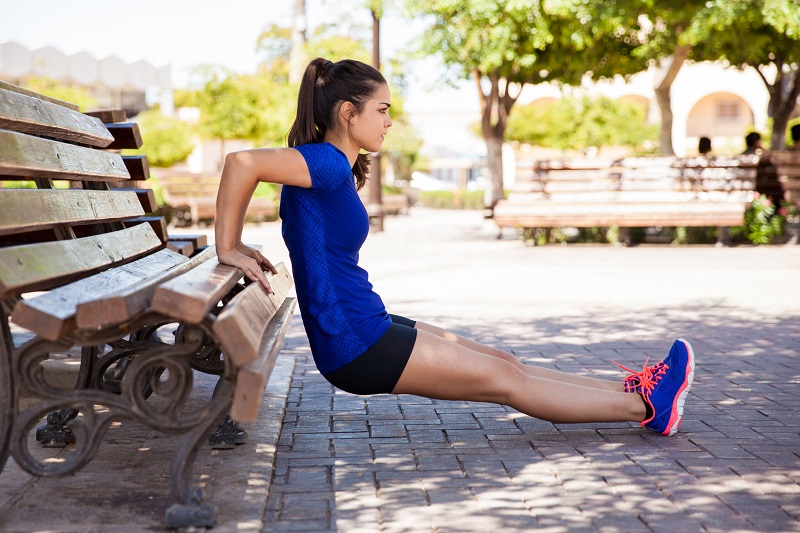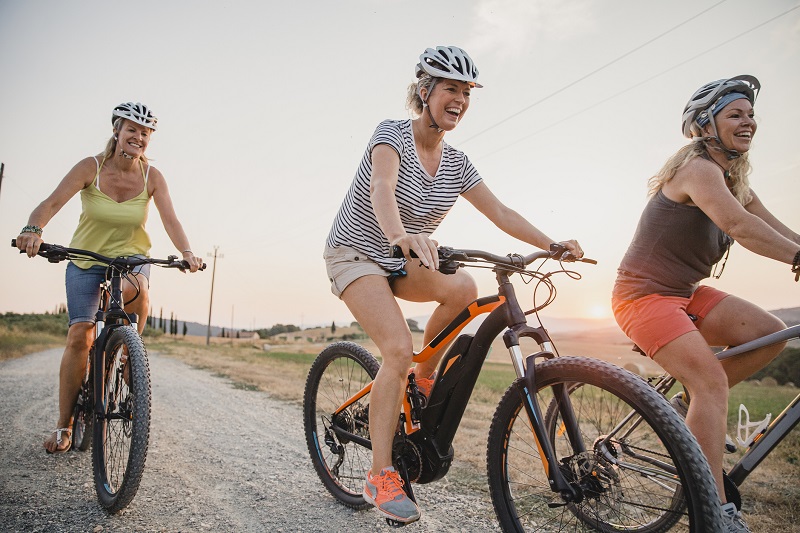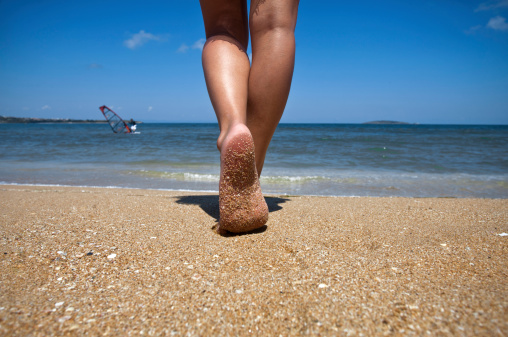Summer exercising means it doesn’t have to feel like exercise: You’re enjoying the outdoors, walking on the beach, riding bikes with the kids, and moving because all that sunshine demands it.
While many people try to lose weight “in time for” the hot months, being on a weight loss journey during the sunny season gets all that bonus calorie burn. Summer exercising can help you lose weight, feel great, reduce disease risks, and reach your goals by fall.

Even if you usually hate to exercise, you’ll love these options. Here are five easy ways to turn fun outdoor activities into bonus weight loss this summer:
1. Switch up your pace, even just a little.

One of the best ways to burn fat while exercising is to perform interval training, alternating higher-intensity bursts of effort with lower-intensity resting periods. It’s a process used by elite athletes and everyday dieters. Science shows that it works: According to the Journal of Obesity, many studies have found that this kind of training is better at burning fat than continuous pace exercise. The secret behind HIIT classes is that exercisers sweat it out at almost maximum effort for short bursts.
But this is the summer! Take it easy, and you can still get those interval benefits: Change your walking pace a little bit every minute. In one study published in Biology Letters, scientists found that when walkers performed faster bursts, increasing their pace by just five inches per second, they burned up to 20 percent more calories during their walk than other participants who strolled at a constant pace. Try it: If you’re out walking, try picking up your pace for 30 seconds, then go at a slower pace for 30 more. Continue in this way throughout your walk.
2. Get strong on a park bench.

While you’re out walking, get stronger! This is an excellent time to exercise into your summer routine. Strength training increases your bone density, staving off osteoporosis, raises testosterone levels in men, and can help keep your metabolism humming—since lean muscle burns more calories at rest than fat does. And while you may have seen studies in the news showing that cardio is better for weight loss than strength work, strength training is great for maintaining weight loss and staving off fat gain. In one study by Harvard T.H. Chan School of Public Health, 20-minute strength-training sessions helped fight “age-related fat gain” around the belly.
If you’re hoping to spend more time outside, there’s good news: You don’t have to get under a barbell to get stronger. A park bench can provide the help you need to turn a walk or jog into a strength-building session.
Try these three moves:
- Elevated Push-up:
Place your hands on the bench seat and assume the classic push-up position: Arms perpendicular to your torso, your body forming a straight line from head to heels. Maintaining this rigid body line, bend your elbows to lower your chest towards the bench seat. Keep your elbows relatively tight to your sides rather than flaring them out at a 90-degree angle to protect your shoulders from pain and injury. Press back to start. Go for sets of five push-ups, aiming for 20 or more total in each session. Too hard? Use the back of the bench instead of the seat. - Bench Squat:
Stand in front of the bench seat with your feet about hip-distance apart, and toes pointed slightly out. Push your hips back to control your descent and sit down without using your hands. Keeping your weight in your heels, stand back up without using your arms. Go for five sets of five squats to start. Too easy? Stand up next to the bench and do full squats, holding the edge of the back of the bench for support. - Bench Step-up:
Stand with the bench in front of you. Keep your torso upright as you place your right foot on the bench and press through your heel to bring your left foot up, so you’re standing on the bench. Return to the ground, and repeat with the other leg. Go for five sets of five on each leg. Too hard or worried about your balance? Instead of standing up on the bench, alternate just lifting your foot and placing it on the bench. You’ll still be lifting your leg higher than you do while walking or climbing stairs.

3. Take a dip in those warm summer waters.

Swimming has been found to make exercisers gain weight: In one study published in the American Journal of Sports Medicine, over six months, exercisers who continually increased the amount they ran or cycled lost 17 and 19 pounds, even with no restrictions on their calorie intake. Swimmers in the same study gained five pounds. And that seems like no surprise: When many exercisers finish swimming, they’re ravenous.
But not every study agrees: In another study published in The Journal of Sports Medicine and Physical Fitness, of 38 middle-aged obese women, those who swam lost the same weight—13 pounds—as those who walked. The difference may have been water temperature: After immersion in cold water, people are hungry, according to the International Journal of Sport Nutrition and Exercise Metabolism. In the study where swimmers gained weight, the water was colder than in the study where they lost weight.
That’s good news for summer exercising: Warmer water! So if you love to swim or want to take some pressure off your joints, a workout in the pool can be just as effective as a land-based movement for losing weight.
4. Go for a nice, long ride, walk, jog, or hike.

Short bursts are all the rage in fitness because those intervals are more efficient than cardio at a continuous pace, according to the Journal of Diabetes Research. But that doesn’t mean longer workouts don’t work at all: With shorter work, you burn more calories in less time, which is great for slipping in a quick workout when you’re busy with work, taking the kids to school, and a million other responsibilities.
In the summer, though, you may have more time for a leisurely session—and you may like it more. Exercise that you enjoy is more likely to be an exercise that you do…which is why finding something you love is vital. Grab your family and tour your vacation spot—or your town—on a longer hike, walk, or bike ride. And you may find that stubborn fat does come off: A 2014 study found that while shorter intervals were more efficient exercise, they were not better at redistributing fat than a continuous pace—the leanest athletes swear by walking or light biking, known as “low-intensity, steady-state” (or “LISS”) cardio.

5. Want to run? Head for the hills.

When many Americans think of summer exercise, their first thought is to go for a run. But hitting the pavement can cause injury: In one review of 17 different studies published in the British Journal of Sports Medicine, researchers found that between 19 and 79 percent of runners suffered injuries. Older runners fared worst, getting hurt the most often.
If it’s been a while since you’ve gone for a run, try starting on a hill. The shortened stride makes the movement safer for your hamstrings, and it can be easier on your knees. A hill also makes interval training easy: Run up the hill for your high-intensity burst, then walk down for your rest period (running downhill can be tough on your knees). Repeat five times to start, and work on adding more intervals over time.
As a veteran fitness technology innovator and the founder of GearUpToFit.com, Alex Papaioannou stands at the intersection of health science and artificial intelligence. With over a decade of specialized experience in digital wellness solutions, he’s transforming how people approach their fitness journey through data-driven methodologies.
